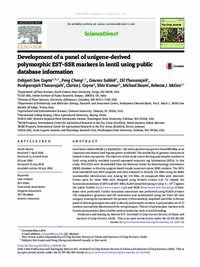Development of a panel of unigene derived polymorphic EST-SSR markers in lentil using public database information

Authors:
Lentil (Lens culinaris Medik.), a diploid (2n = 14) with a genome size greater than 4000 Mbp, is an important cool season food legume grown worldwide. The availability of genomic resources is limited in this crop species. The objective of this study was to develop polymorphic markers in lentil using publicly available curated expressed sequence tag information (ESTs). In this study, 9513 ESTs were downloaded from the National Center for Biotechnology Information (NCBI) database to develop unigene-based simple sequence repeat (SSR) markers. The ESTs were assembled into 4053 unigenes and then analyzed to identify 374 SSRs using the MISA microsatellite identification tool. Among the 374 SSRs, 26 compound SSRs were observed. Primer pairs for these SSRs were designed using Primer3 version 1.14. To classify the functional annotation of ESTs and EST–SSRs, BLASTx searches (using E-value 1 × 10− 5) against the public UniProt (http://www.uniprot.org/) and NCBI (http://www.ncbi.nlh.nih.gov/) databases were performed. Further functional annotation was performed using PLAZA (version 3.0) comparative genomics and GO annotation was summarized using the Plant GO slim category. Among the synthesized 312 primers, 219 successfully amplified Lens DNA. A diverse panel of 24 Lens genotypes was used to identify polymorphic markers. A polymorphic set of 57 markers successfully discriminated the test genotypes. This set of polymorphic markers with functional annotation data could be used as molecular tools in lentil breeding.
